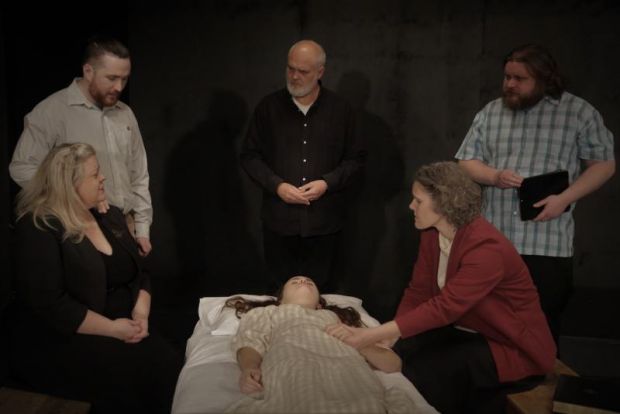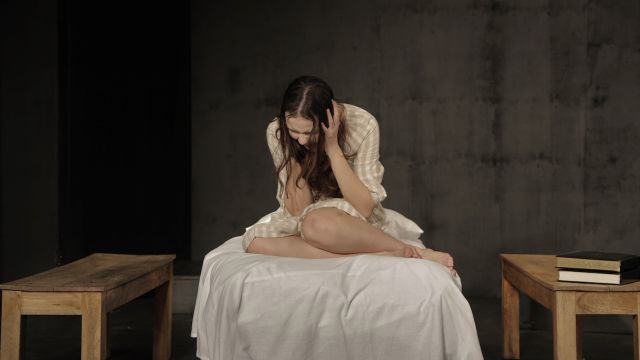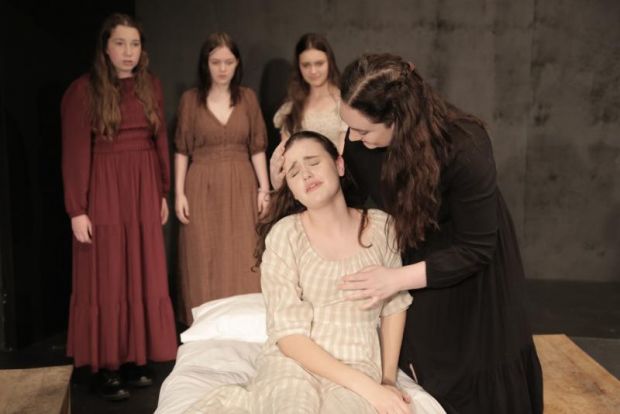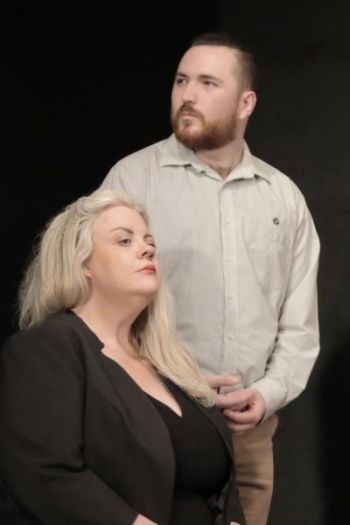By Arthur Miller. Director Rebecca Fletcher. Henry Lawson Theatre, Werrington NSW. 1-17 September, 2023
Reviewed : 1 September, 2023*

Arthur Miller wrote The Crucible as an allegory of events in America in 1950s, where the fear of communism became so endemic that many people with left-wing or seemingly ‘subversive’ ideas were accused of “Un-American Activities”. He based the story on the Salem witch trials that occurred in the Massachusetts Bay Colony in the 1690s. The play premiered in January 1953 – and in 1956 Miller himself was questioned and convicted by the House of Representatives Committee on Un-American Activities.
It’s a weighty play in more ways than one! Apart from its controversial theme, it is long. It has a big cast. But it’s a “well made” play that is carefully structured. There are some great parts. And, with the turmoil in the world today, what better time to mount a play about the effect of lies and lust and mass hysteria.
Rebecca Fletcher has directed the play with intelligent imagination. Firstly, with designers Nicole Smith and Joshua Paterson, she sets the play on a stark, spare, grey stage that conjures aptly the small, ultra-conservative, God-fearful community of Puritan Salem. With atmospheric lighting designed by Mark Prophet, and a few props, modest costumes, and some screen images, it becomes a bleak wood, an attic bedroom, a humble kitchen, a censoriously charged courtroom.

Fletcher concentrates on the characters, allowing Miller’s words to guide the actors as they delve into their relationships and the rising tension that begins after a group of young girls are observed dancing with a servant from Barbados around a fire in the woods at night. When one of the girls goes into a trance, her father, a minister who preaches fire and brimstone, suggests the possibility of witchcraft. The idea festers, until the whole town is besieged by accusations, arrests and executions.
Much of this is exacerbated by Abigail Williams, an orphan servant girl who seeks to avenge her dismissal by Elizabeth Proctor, the wife of the man with whom she has had an adulterous relationship. Manipulative and ruthless, Abigail controls the other girls, whipping them into hysterics until eventually they confess that they had “conjured spirits” and accuse others in the community of worshipping the devil.
Abigail is sometimes over-played, but under Fletcher’s direction Tayah Gulyas makes her aloof, ruthless and self-controlled. That control that is shown in her cold eyes and the way they harden perceptively at the moment she begins her exploitation of the girls. Gulyas sustains that under lying iciness throughout the production. Even when she offers herself to Proctor, there is malice in her seductive words and spite in her reaction to his final rejection.

Joshua Paterson is striking as the stalwart – but flawed – John Proctor. Paterson makes this oft’ played character his own. He is a persuasive presence on the stage, his voice strong and convincing, his stance and movement characterising Proctor’s inner strength and growing decisiveness – despite an accident shortly before opening night that resulted in a broken leg, and the need to re-block his scenes so he could use a crutch.
In six days, Paterson made that crutch, and the somewhat stilted movement it dictates, part of his character, leaning weight to Proctor’s stiff belief in right and integrity. Paterson and Fletcher are to be congratulated on their creative re-imagining of the blocking and how it empowered Paterson’s impressive interpretation of this well-known role.
Elizabeth Proctor is played with heart-felt compassion by Holly-Leigh Prophet. Prophet uses her expressive face to show the range of emotions that this steadfast character faces over the course of the play. She uses body language – hands clasped tightly at her waist, back straight, almost rigid at times – to show her reserve and her staunch loyalty to her husband, despite his confession of adultery. Her tears in the final moments of the production whisper her anguish even after the lights fade.
Stephen Ollis plays Reverend Parris as a hard, pitiless parson, intent on his own advancement and quick to find fault and accuse, despite the lack of respect shown him by others.
Mary Warren, who replaced Abigail as housemaid in the Proctor’s home, is played by Layissa Mugridge, who finds the fear that dominates Warren’s life – fear of Abigail, fear of Proctor, fear of her fate. In the courtroom, Mugridge holds herself stiffly, cowering, her head bowed, her face when she looks up, filled with dread.
Georgia Willett plays the much less fearful Tituba. Fletcher uses Tituba’s Caribbean background to lighten the production, contrasting her movement and words with the oppression that dogs the Puritan community … and Willett relishes the guilelessness and naivety of the role.

Nicole Madden, as Mercy Lewis, leads young actors Leisel Hussey, Olivia Gray, Lily Hampson and Mya Crosetta as the girls who fall prey to Abigail’s manipulative power. Lewis, who runs the company’s Youth Theatre program, guides her young protégés as they are harangued by the stern Parris, questioned by the more compassionate Reverend Hale (Mitchell Rist), interrogated by the Judge Danforth (Ken Fletcher) and Judge Hawthorn (Mark Prophet) and led to screaming visions by Abigail.
The women of Salem are represented by the quiet, highly respected Rebecca Nurse played with grandmotherly gentleness by Michelle Hussey. And the more volatile Ann Putnam, a gossip obsessed with the loss of seven babies, played with jealous, accusatory harshness by Nicole Smith.
Caught up in the maelstrom of allegations, arrests and trials of their women folk, the men of Salem are played by Davo Hardy, Campbell Simpson, Aled Stephens, Elliott Prophet and Aurel Vasilescu.
Rebecca Fletcher has led her cast with a conscientious, creative hand, ensuring the characters are clearly defined and the action carefully paced. It is not easy managing such a large cast, of varying experience, but she does so judiciously, staying true to the infamous characters and the playwright’s critical intent.
First published in Stage Whispers magazine
*Opening performance